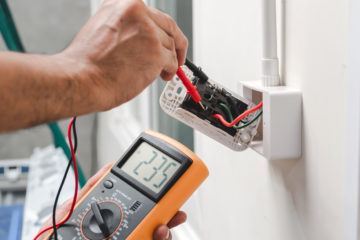What are Electrical Safety Checks?
By lucmin on 16th March 2021

Whilst not the most glamorous aspect of property ownership, electrical safety checks are extremely important and moreover, mandatory! Did you know that mandatory electrical testing and installation inspections came into force in England for new tenancies from 1 July 2020? If you did not, you may not know the different formats for the tests and those which are mandatory and those recommended. Lucky for you, Move know their stuff and are here to help.
Please note, existing tenancies will have until April 2021 to comply.
First of all, what types of electrical testing are currently available?
Fixed wire testing
Fixed wired testing involves the testing of all electrical installations and systems that conduct electricity throughout the home – examples of which are, main panels, distribution boards, socket outlets, a/c etc – around the building. Once the electrical installation has been tested and verified as safe, an EICR (Electrical Installation Condition Report) can be issued. Under the new regulations, landlords are required to commission an EICR at least once every five years. EICRs will test things like the adequacy of earthing and bonding, wear and tear, whether any wires are exposed and if any of the installations are damaged or malfunctioning. By obtaining these reports, you are making sure to maintain the safety of the home and tenants within it.
Landlords are legally obligated to ensure electrical installations within their property are maintained safely. Some insurance companies will also want to see an EICR before they insure a property, so it is important to take this seriously.
Mandatory Obligation.
Portable Appliance Testing (PAT)
Portable Appliance Testing is exactly what it says on the tin! It involves the testing of any movable electrical appliance, such as toasters, kettles, fans, portable heaters or anything else the landlord might have supplied to a property. As with an EICR, it must be carried out by a qualified, registered technician, who will carry out a series of visual and electronic tests to ensure that an appliance is working effectively. Once the tests have been completed, the electrician will provide a full inventory and each item will have either a pass or fail sticker affixed to it.
PATs are not currently mandatory for Landlords however, they are recommended.
Regulatory Changes in 2020
Under the Electrical Safety Standards in the Private Rented Sector (England) Regulations 2020, the government requires every fixed electrical installation within a rental property to be inspected and tested every five years by a registered and qualified person.
Once the EICR inspection has been carried out, the landlord must provide a copy of the results to the tenants of the property within 28 days. The landlord must also retain a copy of the results until the next test five years later. If they fail to meet either of these stipulations or fail to comply with the testing within the timeframe, they can face a financial penalty of up to £30,000.00!
